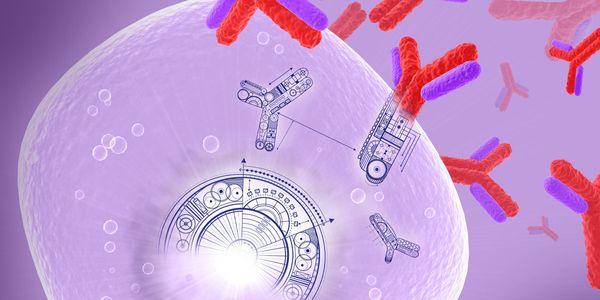Gene Therapy
Gene Therapy: Gene therapy is designed to introduce genetic material into cells to compensate for abnormal genes or to make a beneficial protein. If a mutated gene causes a necessary protein to be faulty or missing, gene therapy may be able to introduce a normal copy of the gene to restore the function of the protein.
-
SEP 16, 2021 | 8:00 AMDate: September 16, 2021 Time: 8:00am (PDT), 11:00am (EDT) Rapid screening and speed of scale-up in protein therapeutics are critical factors in today’s biotech and pharma workflows. T...SEP 14, 2021 | 7:00 AMDate: September 14, 2021 Time: 7am PDT, 10am EDT, 4pm CEST A conventional thermal cycler has long been a commodity product in the lab and end-point PCR techniques can be completed almost wit...SEP 09, 2021 | 8:00 AMDate: September 09, 2021 Time: 8:00am (PDT), 11:00am (EDT) Human pluripotent stem cells (PSCs) hold great potentials in regenerative therapies. In this webinar, Chao will first present the c...Learning Objectives: 1. Explore the neuroinvasive potential of SARS-CoV-2 2. Learn about possible consequences of neuroinvasion of SARS-CoV-2 3. Identify neuroimmune responses against SARS-C...
Adolescence is a critical period for the developing brain, and binge drinking during this neuromaturation can result in enduring abnormal brain function and behavior. Repeated adolescent bin...
Over 40 tandem repeats undergo expansion events that lead to neurological disease. This number is likely an underestimate as many repeats are difficult to amplify using existing short read s...
Speaker:
Paul Valdmanis, PhD
Parkinson’s disease (PD) is the second most common neurodegenerative disorder with multiple motor and non-motor symptoms. PD is characterized by the presence on proteinaceous neuronal...
Several age-related neurodegenerative disorders are characterized by the deposition of aberrantly folded proteins. The histopathological hallmark of synucleinopathies is the deposition of ɑ-...
JUL 28, 2021 | 7:00 AM
Date: July 28, 2021 Time: 7:00am PDT Bacterial persistence is a potential cause of antibiotic therapy failure. Antibiotic-tolerant persisters originate from phenotypic differentiation within...
JUL 13, 2021 | 11:00 AM
Date: July 13, 2021 Time: 11:00am (PDT), 1:00pm (EDT) 1 R&D, Cell Culture & Fermentation Sciences, Bio Pharmaceutical Development, AstraZeneca, Gaithersburg, USA, 2 R&D, ADPE, Ce...
JUL 01, 2021 | 8:00 AM
Date: July 1, 2021 Time: 8:00am (PDT), 11:00am (EDT), 5:00pm (CEST) What’s driving precision-medicine innovations? New advances in gene and cell therapy manufacturing, along with more...
JUL 01, 2021 | 12:00 PM
Date: July 01, 2021 Time: 09:30am IST/12:00pm SGT/01:00pm JST, KST/03:00pm AEST/ 05:00pm NZST We know that understanding cell culture is essential for life of your work. Gibco Galaxy Tour We...
JUN 30, 2021 | 7:00 AM
Date: June 30, 2021 Time: 7:00am (PDT), 8:00am (EDT) Join us to discover how Optical genome mapping (OGM) mapping can help you in the characterization of complex samples. OGM is a non-sequen...
JUN 24, 2021 | 8:00 AM
Date: June 24, 2021 Time: 8:00am (PDT), 11:00am (EDT) Cardiovascular disease is a leading health problem, affecting almost 30% of individuals in the developed world, and comprises a wide ran...
JUN 23, 2021 | 9:00 AM
Date: June 23, 2021 Time: 9:00am PDT Adeno-associated virus (AAV) is rapidly becoming the go-to biological delivery method for the latest gene therapy breakthroughs. AAV has an efficacy and...
JUN 16, 2021 | 7:00 AM
Date: June 16, 2021 Time: 7:00am (PDT), 10:00am (EDT) Non-small cell lung cancer (NSCLC) has become an important example of precision medicine among solid tumor malignancies. Next-generation...
JUN 09, 2021 | 7:00 AM
Date: June 9, 2021 Time: 09 June 2021, 7am PDT, 10am EDT, 4pm CEST cells with dramatic implications on the validity of past cell culture related research. The fact that at least 509 cell lin...
JUN 03, 2021 | 8:00 AM
Date: June 3, 2021 Time: 8:00am (PDT), 11:00am (EDT), 5:00pm (CEST) Molecular combing provides unbiased quantification and characterization of DNA structure and dynamics by imaging single DN...
JUN 03, 2021 | 12:00 PM
DATE: June 3, 2021 TIME: 12:00pm SGT This webinar is a virtual event that focuses on utilizing the Gibco CTS Rotea System for Cell and Gene Therapy...
Speaker:
Premkumar Jayaraman, PhD
, Emily Benz
, Eric Dubofsky
Sponsored By: Thermo Fisher Scientific
MAY 27, 2021 | 8:00 AM
Date: May 27, 2021 Time: 8:00am (PDT), 11:00am (EDT) With social distancing measures still enforced in large parts of the world, many researchers must minimize time in the lab where they may...
MAY 25, 2021 | 8:00 AM
Date: May 25, 2021 Time: 8:00am (PDT) Reliable expression of recombinant proteins in human, CHO, or insect cells is essential for many aspects of biomedical research and drug development, bu...
The pandemic sent pharmaceutical and medical device industries scrambling to continue operations under social distancing guidelines. Businesses sent their employees to work from home, yet so...
MAY 11, 2021 | 10:00 AM
Date: May 11, 2021 Time: 10:00zm PDT Your samples are some of the most valuable assets in the laboratory. After spending countless hours on extraction and preparation, your conclusions could...
Speaker:
Paulina Kocjan
, Kate Meola
, Zareh Zurabyan
Engineered cell therapy is an emerging field of science to target and treat cancer. Current strategies include utilizing immune cells such as T cells, NK cells and Macrophages or other cells...
























